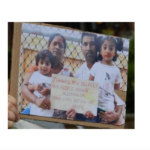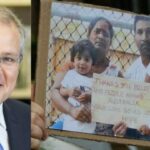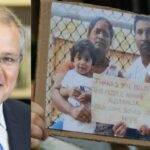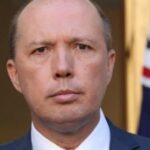Biloela Family Will Return to Their Community, But for How Long?
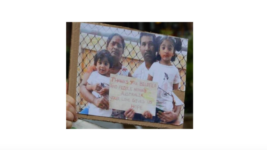
New Prime minister Anthony Albanese has made much of the Murugappan’s family’s plight over the past few years, often calling their detention and ongoing court battle with the Federal Government ‘publicly funded torture.’
He was explicit in the lead up to the recent election that if he was to become Prime Minister, the family would be sent home to Biloela.
And within days of being elected, Mr Albanese made good on that promise – sort of.
Bridging Visas granted
Last week, the family were granted temporary bridging visas and told they could return to the small Biloela community which has campaigned for their return since they were removed from their home in a dawn raid by Australian Border Force officials in 2018.
Shortly after being removed from their home, the family was detained on Christmas Island alone – at exorbitant cost to Australian taxpayers.
Battle to remain continues
The family remains in a battle with the Federal Government over their visa status – which is complicated because Australia’s strict immigration policies.
The family of four had a win in 2020 when the Federal Court government to pay them $200,000 in legal costs because they had been denied due process.
They were then only allowed to briefly leave Christmas Island after their youngest daughter, Tharunicaa, became gravely ill last year.
They have been in a type of community detention in Perth since then, and will return to Queensland in the next few days.
Appalling treatment by politicians
Previous Immigration Ministers – Peter Dutton and Alex Hawke were heavily criticised for keeping the family in ‘limbo’, often threatening to return them to Sri Lanka with the ‘God Like’ powers that come with the role – powers that enable them to simply make the entire issue disappear.
Former Prime minister Scott Morrison was also criticised for his hypocrisy, often making a display of his Christian faith and speaking about how much his own daughters meant to him, while at the same time, as being head of the Government which detained this family for four years.
The new Immigration Minister is yet to be announced. Currently, Jim Chalmers is acting as the interim Home Affairs Minister, and promptly ensured the family members were each given bridging visas.
If Ministerial power is used to allow the family to stay in Australia permanently, the Federal Court battle could end, the family could get on with rebuilding their lives and taxpayers will stop having to pay millions of dollars per year to keep a beloved family in offshore detention.
Many Australians are appalled at the way this family has been treated by the former Federal Government, and the situation has done nothing to improve our reputation on the international stage as a country compassionate to the plight of refugees and asylum seekers.
Prior to being detained, Nades had a job and took care of his family. They have only become reliant on ‘the system’ because it imprisoned them.
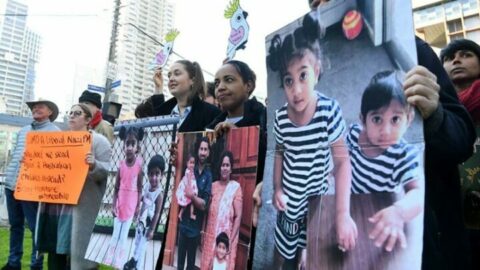
What about other asylum seekers?
The pressure is on the Albanese Government to resolve the case once and for all, from the Greens, in particular senator Sarah Hansen young, and refugee advocates too.
In many ways, it seems that this is no-brainer for the new Government – an issue it can resolve, and at the same time, get some early runs on the board.
But it does beg the question – what will the new Federal Government do about the hundreds of other refugees in limbo – particularly those from Naru and Manus Island who are still languishing in hotels, waiting for essential medical treatment, after Medevac laws were repealed in 2019 – another shameful moment in Australia’s treatment of refugees.
The Healthcare denied: Medevac and the long wait for essential medical treatment in Australian immigration detention report was released last year by the Public Interest Advocacy Centre.
It highlighted both the poor health and debilitating conditions that some refugees are in, as well as the fact that not providing basic duty of care is a breach of the Government’s legal obligation to these people.
What will the new Labor government do?
According to published figures there are around 30,000 cases similar to those of the Murugappan who arrived in Australia by boat between August 2012 and December 2013, known as the “legacy caseload”.
People who were found to be refugees (approximately 19,000) were only granted temporary visas, which doesn’t allow them to settle permanently in Australia or sponsor close family members who are overseas.
Labor has indicated that its policy is to abolish temporary protection visas and to grant permanent visas to those who’ve been found to be refugees. It has also agreed to abolish the fast-track system that was used to process cases from the legacy caseload, due to concerns around the fairness of this system.
However, Labor also stated that it will maintain Operation Sovereign Borders.
A boat intercepted by Australian Border Force on election day was turned back to Sri Lanka on the direction of Acting Prime Minister Richard Marles, after all passengers were screened for their ‘status.’
The fact of the matter is that Australia has some of the toughest imigration laws in the world. These laws provide mandatory detention for any person who does not have a visa.
However, once a person is detained it is not possible for them to to seek an independent review of their particular circumstances, and they remain in detention or are forced to leave the country.
Figures printed this year show that the average time spent in detention was 689 days.
Some people have been in immigration detention for as long as a decade.


